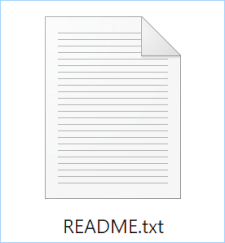Readme
A Readme file (sometimes capitalized README) is a text file that provides some basic documentation for a software program. It is usually paired with, or installed by, a program's installer. Most Readme files are plain text, although some may include images or video.
Readme files typically include a few categories of information. Most include instructions for configuring and using the program, especially if it requires steps that may not be intuitive. It will also display copyright information and developer credits, letting users know who was involved in the program's development. Comprehensive Readme files will also include troubleshooting steps to address common problems and a change log of recent updates, bug fixes, and patches.
Now that nearly all software distribution happens over the Internet, the information covered in a Readme file is often also found on the program's website. This allows the program's developer to update information frequently and provide a change log that the user can see before updating. The developer can even create more comprehensive documentation with the assistance of the program's user base by using Wiki software.
 Test Your Knowledge
Test Your Knowledge